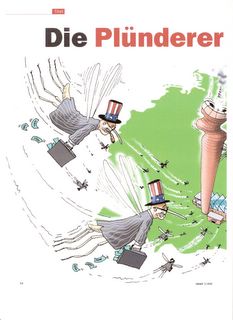Locust Round-Up
David at Medienkritik notes more evidence of the German Left's "locust" campaign against American investment firms: this in the form of illustrations from the monthly magazine of IG Metall, Germany's most important trade union with a membership of some 2.4 million. Here the "locusts" have become mosquitos and they wear Uncle Sam hats, so there can be no confusion about from just which swamp they are supposed to have come. The cover reads: "The [Blood-]Suckers: US Firms in Germany".
It is relatively rare that David or Ray D. push the Goebbels button, so if they do so here, it is because something important is happening. Nonetheless, David suggests that at least the IG Metall cartoons avoid the anti-Semitic physical stereotypes of Julius Streicher and Der Stuermer fame or infamy. I'm not so sure. Here is a scan of another image from the IG Metall issue. It's the image that appears on the first page of the accompanying article: "The Plunderers are Here". Click on the image for a larger version. It is disturbing, to say the least.

Update:
Ed Lasky from The American Thinker points out to me that besides Saban and Goldman Sachs, some of the other firms in the SPD “locust” list also have prominent Jewish partners. One can wonder whether the SPD strategists were conscious of this in compiling their “list” and whether the association is likely to be made by the German public. But at least in one pivotal case – namely, KKR, otherwise known as Kohlberg, Kravis and Roberts and which comes in for particular (and particularly undeserved) criticism from the SPD – the answer to both questions is almost certainly “yes”. Unfortunately, German public discourse is far from being insouciant about who is Jewish and who is not. If anything, it is hyper-alert to the matter. Indeed, the public debate provoked by the SPD’s “locust” campaign in Germany has provided some inadvertent and thereby all the more telling confirmation of this.
Thus, just yesterday, Michael Wolffsohn, a professor of Modern History at the Bundeswehr University in Munich, published an opinion piece in the Rheinischen Post in which he accuses the SPD of employing a dehumanizing vocabulary and “models of thought” [Denkmuster] in its “locust” campaign that are reminiscent of Nazi propaganda. The charge will hardly seem implausible to readers of Trans-Int or Kosmoblog. Indeed, Nazi propaganda did not only use terms analogous to Müntefering’s “locusts” to dehumanize the supposed enemies of Germany and Germans. As we have seen, the most infamous anti-Semitic propaganda film of the entire Nazi period, "Jud Süss", employs precisely this term for Jews.
Nonetheless, the outraged reaction from SPD dignitaries was not long in coming. Thus, an article in today’s Spiegel Online quotes SPD Member of Parliament - and “right-wing extremism expert” - Sebastian Edathy to the effect that Wolffsohn’s comparisons are “incomprehensible and absurd” and the “implicit accusation that Müntefering is spreading anti-Semitism,” “outrageous”. It also quotes, among others,
the SPD Chair of the Economic Committee of the Bundestag, Rainer Wend: “The man does not have all his marbles”;
the head of the Nordrhein Westfalen SPD Harald Schartau: Wolffsohn must apologize for his “incredible faux pas”;
the SPD Chair of the Domestic Affairs Committe of the Bundestag, Cornelie Sonntag-Wolgast: Wolffsohn must retract his “unspeakable” comments;
and the head of the Bavarian SPD Ludwig Stiegler: “Wolffsohn is out of his mind if he attacks of all things the SPD with such accusations.”
Well, if ever there was an occasion to paraphrase Shakespeare, it is now: “The ladies do protest most decidedly too much”. Wolffsohn’s article – which is available on-line here (hat tip the indispensable Ulrich Speck) – does not “implicitly” accuse Müntefering of “spreading anti-Semitism”. It explicitly accuses him and his SPD colleagues of “spreading” anti-Americanism – the article is about anti-Americanism – and of using Nazi vocabulary and imagery to do so. Wolffsohn points out – he could hardly avoid doing so – that in its own time, the Nazi vocabulary and imagery were principally used to dehumanize Jews.
Moreover, as Ulrich notes, it is curious that an earlier article by Christoph Keese in the Welt am Sonntag, which already made similar charges, did not draw anywhere near the same amount of attention and ire. This is despite the fact that Keese’s article is considerably bolder than Wolffsohn’s: for example, unlike Wolffsohn’s article, it does accuse Müntefering of mobilizing anti-Semitic ressentiments and it does so not merely “implicitly”. What then explains the difference in the response from the SPD dignitaries?
The first sentence of the Spiegel Online article provides a clue:
“On Müntefering’s Style” – this is the heading under which the polemic appears that the Jewish historian Michael Wolffsohn...published in today’s Rheinischen Post.


<< Home